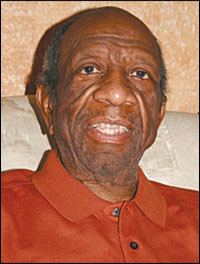
Am Fam Physician. 2008;78(12):1354

My family physician noticed that I had been sniffling continuously. When the medication she gave me wasn't working, she sent me to Dr. H, who sent me to Dr. M, who found out that I had carcinoma of the esophagus. My team of nine doctors and specialists assembled and, after joint rounds of radiation and chemotherapy, they extracted the carcinoma during a 12-hour surgery.
The surgeon explained how difficult the procedure was, delving into the center of my chest to remove the tumor. My doctors are all very honest. Dr. M always looks over those glasses of his and tells me exactly what he is going to do. I appreciate their honesty and dedication.
I remember one particular time when I was in the hospital because of fluid in my right lung. Dr. O visited, sat down next to me and said, “You are going to be fine. I am right here beside you if you need me.” It is empowering to know that my doctors genuinely care about me. I have a strong will to live, and my doctors knew from the start that I was depending on them to get me through this. They always listened to my concerns and advocated for my best interests.
Now I'm being monitored constantly—my doctors are still in the process of trying to get me well. Every so often, I have low temperatures and low white and red blood cell counts. I have difficulty swallowing, loss of my voice, constant coughing, and stomach pains after eating. I am trying to regain strength after losing 60 lb, and I will get there. What has gotten me through all of this, you ask? Guts. I want to live. I've never thought of giving up. I told my doctors to take every last bit of that cancer out, because I have to see my grandsons grow up.
Through my experiences, I've learned what a good doctor is about. I am very fortunate to have a good team. I know I can depend on them. My doctors were always there for me, and they still are. As long as they are here, I'm not going anywhere.—L.H., 78
COMMENTARY
Shortly after sharing his story, L.H. called to report symptoms of progressive dysphagia, with an inability to swallow any food or liquid. He was again hospitalized, and died soon after. L.H. was shuttled from home to hospital and in and out of the offices of his medical and radiation oncologists, surgeon, and gastroenterologist. He and his family relied on me, as his family doctor, to assemble an excellent team and to stay on top of his progress. In cases such as this, it may seem that the family physician loses the role of the primary caregiver. In fact, our patients and their families rely on us more than ever to provide guidance and support, and to be there when the end is near.